|  | |
 |
| WHSC Sets New Record for Research Funding—Again | Congratulations to research teams from the Woodruff Health Sciences Center (WHSC), and indeed across all of Emory, on another record-shattering year of research funding. Emory University achieved a new funding milestone of $944.5 million during FY2022. This extraordinary achievement breaks the institution’s previous record of $894.7 million last fiscal year and represents our first year exceeding $900 million. The units of the WHSC brought in $899.5 million—or 95 percent—of that record-breaking total. In the health sciences alone, that represents a phenomenal increase of more than $52 million over last year’s total, which was itself a new WHSC record.
This outstanding performance confirms what I’ve known since joining the Emory team and participating in the growth of this institution as a leading global research university. We have become one of the most collaborative, energetic, talented, industrious, resourceful, and successful research enterprises in the nation. This research has impact, saves and improves lives, and transforms the ways in which we prevent, detect, and treat disease.
Thanks to each of you for making this extraordinary achievement possible. I look forward to all that you will accomplish in FY2023 and beyond.
Please direct questions and comments to evphafeedback@emory.edu.
David S. Stephens, MD
Interim Executive Vice President for Health Affairs
Interim Executive Director of the Woodruff Health Sciences Center | |
| |
|  | A launch pad for innovation | A major feature of Emory’s new Health Sciences Research Building (HSRB) II is Lab2Launch, state-of-the-art laboratory space for start-up companies affiliated with Emory. The coworking environment is designed to support scientist-entrepreneurs in taking their discoveries from lab to market and to foster collaborations between scientists. Lab2Launch residents can get an assist in the former endeavor from Biolocity—a program within the joint Coulter Department of Biomedical Engineering that works with early-stage innovators across Emory and Georgia Tech through funding, project management, and consultation to help them commercialize their discoveries.
Lab2Launch is on HSRB II’s ground floor, dubbed the Raymond F. Schinazi Family Innovation Floor, as it was made possible by a generous gift from Schinazi. The floor will also feature a 3D printing and micromachining area, extended reality and artificial intelligence technologies, and seminar space. Also included within HSRB-II are several other core facilities that support research and development.
“In my experience, you need to create new companies to take discoveries from the laboratory to the clinic,” says Shinazi. “I believe that the modern tools and extensive resources available through the Innovation Floor will accelerate the ability of start-up companies to transform laboratory discoveries into drugs that prevent, treat, and ultimately cure life-threatening diseases.”
Lab2Launch, which is scheduled to occupy in early 2023, will be available to Emory scientists who already have a start-up company as well as to outside companies that hold licenses to and are commercializing Emory intellectual property. Applications will be open later this year. The laboratory has dry workstations with assigned desking, 48 benches, and three small private labs for companies in a later stage of development that need dedicated space.
“The space itself is amazing,” says Mike Cassidy, director, Emory Biomedical Catalyst, who has been involved in the development of the space. “Lab2Launch residents will have access to sophisticated core facilities that will be in HSRB II and are not typically available to start-up companies."
Lab2Launch is designed to be flexible. Scientists can just rent one lab bench if that is all they need to get started. This is a major benefit to start-up companies looking to be efficient with capital. “When start-ups are looking for incubator lab space, they often have to take a private laboratory that could be hundreds of square feet with many benches,” says Cassidy. “But a typical early-stage biomedical company often doesn’t need much more than a bench. This space is designed to let scientists bite off only what they can chew at the time, with the ability to take on more when they need to.”
Having many different scientists working shoulder-to-shoulder in a shared lab space is meant to build community and encourage collaboration. “The innovations they are working on may be very different, but they have many of the same challenges in bringing their discoveries to market,” says Harry Gerard, Lab2Launch manager and associate director of Biolocity. “The community nature of the space facilitates informal conversations that can, in turn, lead to partnerships and collaboration down the line.”
Biolocity will support the Lab2Launch space as well as offer its residents a variety of programs and services to support their efforts to commercialize their discoveries. Previously called the Coulter Translational Program, Biolocity has long worked with, and funded, early-stage innovators at Emory and Georgia Tech. “We work with researchers who are producing great science in the lab but may need some business expertise and support to secure intellectual property, which they can then either license or use to start their own company,” says Courtney Law, managing director of Biolocity. “Lab2Launch is a natural extension of that, providing a space for these researchers once they have formed a company.”
Louise Hecker toured the Lab2Launch space earlier this month. She says it’s just what she needs for the company she launched six months ago, PreClinico, which tests drug efficacy in sophisticated animal models. Hecker actually tried—unsuccessfully—to launch a company based on this concept a decade ago at a different university. “At that time, it was really challenging to figure out how to set up a company in an academic setting,” she says.
Now she sees the opportunity to make her company viable. “Emory values and promotes academic entrepreneurs,” she says. “This Lab2Launch space offers the resources we need in the way we need them in order to be successful. It’s great to have everyone moving in the right direction."
Scientist-entrepreneurs interested in learning more about the Lab2Launch space, including the application process, should contact Harry Gerard. | |
| |
|  | DEI Highlight | SOM EMPACT Program Provides Mentoring for Students Who Are Underrepresented in Medicine | Thirty percent of Emory's current medical student population identifies as historically underrepresented in medicine (URiM). To address the unique needs of this group, the Office of Multicultural Affairs established the EMPACT program in 2019. With a recent gift from Barbara Williams 79M, the program received the long-term funding necessary to continue investing in addressing disparities and in expanding the future of medicine.
"There is no better area for me to direct my giving than toward the correction of the continuing inequities in health care for disadvantaged communities of color," explained Williams. "Those of us practicing medicine are acutely aware of not only the disparities in the delivery of good medical care but also in training physicians who can better deliver good care in an equitable way." Read more. | |
| |
| 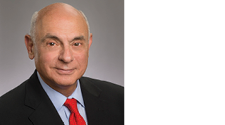 | | Johns honored by National Academy of Medicine | The National Academy of Medicine has honored Michael M.E. Johns with its prestigious Walsh McDermott Medal, which is awarded to a member for distinguished service to the National Academies of Sciences, Engineering and Medicine over an extended period. Johns is an internationally recognized leader in academic medicine and health policy and as a head and neck cancer surgeon. He currently serves as professor in the School of Medicine (SOM) and Rollins School of Public Health (RSPH). He is emeritus executive vice president for Health Affairs at Emory and emeritus president, CEO, and chairman of the board of Emory Healthcare—positions he held at Emory from 1996 to 2007. During this time, Johns engineered the transformation of WHSC into one of the nation’s preeminent centers in education, research, and patient care. Read more.
| | |
| | |  | | Infectious disease leaders selected for top positions and awards by IDSA | The Infectious Diseases Society of America (IDSA), the nation’s leading infectious diseases professional organization, has selected Carlos del Rio, executive associate dean of Emory at Grady Health System, as its new president beginning October 24. Nadine Rouphael, professor of medicine in the Division of Infectious Diseases, received the Oswald Avery Award for Early Achievement, which recognizes outstanding achievement in infectious diseases by a member of IDSA who is 45 or younger. Robin Dretler, chair of the Professional Practice Evaluation Committee at Emory Decatur Hospital, received the Watanakunakorn Clinician Award for his outstanding achievement in the clinical practice of infectious diseases. Colleen Kelley, associate professor of medicine, has been elected to serve as the vice chair of IDSA’s HIV Medicine Association. Read more.
| | |
|
| |
| 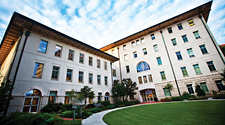 | | SON receives HRSA funding for programs in underserved areas | The US Department of Health and Human Services’ Health Resources and Services Administration (HRSA) has awarded the Nell Hodgson Woodruff School of Nursing (SON) four grants totaling more than $11.8 million for work in health delivery and training programs for underserved areas of Atlanta, Georgia, and the Southeast. The grants will advance the public health workforce in the Atlanta area, establish a mobile health presence in South Georgia and Atlanta, increase the numbers of clinical nursing faculty and preceptors in the Southeast, and prepare students and practicing nurses to advance culturally sensitive acute care in Atlanta communities. Read more.
| | |
| | |  | | Georgia CTSA receives $73.7 million to accelerate research | The National Institutes of Health (NIH) has awarded $58.6 million over the next five years to the Georgia Clinical & Translational Science Alliance (Georgia CTSA) to continue its efforts to advance the quality of clinical and translational research and transform research results to impact health in the state of Georgia and beyond. In addition to NIH funding, the Georgia CTSA will receive $15.1 million in institutional support from its academic institutions.Georgia CTSA is a collaborative research alliance comprised of Emory, Morehouse School of Medicine, Georgia Institute of Technology, and University of Georgia. Partners include Children’s Healthcare of Atlanta. Read more.
| | |
|
| |
|  | | Heart team implants 500th left ventricular assist device | A team from Emory’s Heart and Vascular Center recently completed its 500th continuous flow, durable left ventricular assist device (LVAD) implantation. Currently, Emory Healthcare is the number one LVAD implanting center in the United States. First used in the 1960s, the ventricular assist device—which has since gone through significant evolution, particularly over the past 20 years—supplies mechanical circulatory support by pumping blood from the ventricles, or lower chambers of the heart, to the rest of the body. Read more.
| | |
| | | 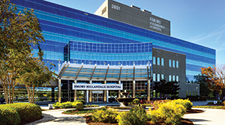 | | DeKalb County funds growth, improvements for Emory Hillandale Hospital | In the wake of Wellstar Atlanta Medical Center’s (AMC) impending closure, the DeKalb County Board of Commissioners approved $12 million in critical funding to expand and renovate parts of Emory Hillandale Hospital (EHH). The funding will assist in ensuring and improving access to local care for DeKalb County residents as health care systems across Atlanta are strained by AMC’s closure. Specifically, the funds will be used to expand EHH’s emergency department, renovate its intensive care unit, improve emergency imaging services, and develop a hospital-based violence prevention and trauma recovery pilot program. Read more.
| | |
|
| |
|  | | Season 4 of “Your Fantastic Mind” premiering in spring 2023 | “Your Fantastic Mind,” an Emmy-winning PBS television series partnership between the Emory Brain Health Center and Georgia Public Broadcasting (GPB), is announcing a fourth season, set to air in spring 2023. The news magazine-style show, first launched in January 2019, highlights patient stories and reports on pioneering science and clinical advances in the areas of neurology, neurosurgery, psychiatry, rehabilitation medicine, and sleep medicine. Season 2 and season 3 are now both in national syndication and have aired or are currently airing in more than 200 television markets and 43 states across the US, as well as in Washington, D.C., and Puerto Rico. Check your local listings for season 4 air dates and times in spring 2023. Visit the “Your Fantastic Mind” website to stream full episodes and segments from the first three seasons.
| | |
| | | 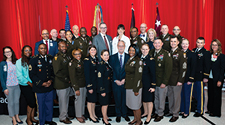 | | US Army medical personnel to train at Grady | Grady Memorial Hospital has become the latest site of the US Army Military-Civilian Trauma Team Training (AMCT3), enabling military medical personnel to share knowledge and advances in combat casualty care and learn from their civilian colleagues at Grady’s nationally verified Level 1 trauma center. The army launched the AMCT3 program in 2019. It helps army medical personnel sustain and build their clinical skills by working at the nation’s premier trauma centers. Grady is the eighth civilian medical center in the country to participate in the program. While military health care personnel will gain invaluable trauma experience, the program also allows their civilian counterparts to obtain knowledge from those who have acquired useful skills while providing medical care in combat zones. Read more.
| | |
|
| |
|  | | Emory Healthcare moves to Epic | On October 1, Emory Healthcare moved to a new electronic medical records system—Epic—that connects all Emory hospitals and clinics onto one single platform and allows patients to access their medical records in a single patient portal—MyChart. The collaboration with Epic will improve Emory Healthcare’s ability to seamlessly share patient records and care information within Emory locations and across the organization while offering optimal self-service options for patients. Epic EHR will replace the health system’s numerous standalone software systems, as well as its legacy acute and ambulatory care billing systems. Read more.
| | |
| | |  | | SON launches Center for Healthcare History and Policy | The SON is launching a Center for Healthcare History and Policy with the aim of solidifying the place of the humanities in health care education and research. The center will bring together Emory scholars and students from various disciplines who are seeking to understand the impact of history, legislation, and policy on health outcomes and the factors that affect health care delivery, especially to marginalized populations. The center will create discussion forums, enhance collaborative grant application and publication initiatives, and host research events. Read more.
| | |
|
| |
| | 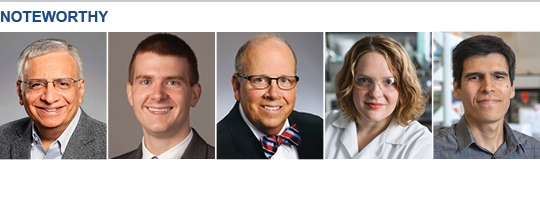 | | Rafi Ahmed, professor of microbiology and immunology, has been named a 2022 fellow of the Academy of Immuno-Oncology by the Society of Immunotherapy of Cancer
Brendan Lovasik, general surgery chief administrative resident, received the 20th annual American College of Surgeons Resident Award for Exemplary Teaching
Charles Staley, chief of the Division of Surgical Oncology, will serve a six-year term on the Complex General Surgical Oncology Board of the American Board of Surgery, and focus on defining the standards and expectations for formal certification of surgeons specializing in surgical oncology.
Cassandra Quave, medical ethnobotanist, received an inaugural Eric and Wendy Schmidt Award for Excellence in Science Communication by a Research Scientist. Read more.
Felipe Garcia Quiroz, a biomedical engineer, received a 2022 NIH Director’s New Innovator Award for his innovative molecular approaches to monitoring clumps of proteins associated with neurodegenerative diseases. Read more. | |
| |
|

